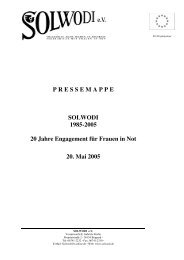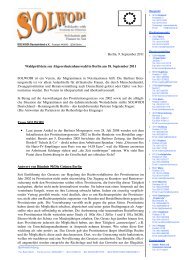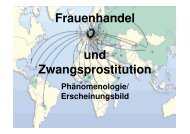Sponsored Vocational Training: Dream of Escape or Reality - Solwodi
Sponsored Vocational Training: Dream of Escape or Reality - Solwodi
Sponsored Vocational Training: Dream of Escape or Reality - Solwodi
You also want an ePaper? Increase the reach of your titles
YUMPU automatically turns print PDFs into web optimized ePapers that Google loves.
Efficacy <strong>of</strong> SOLWODI’s <strong>Vocational</strong> <strong>Training</strong> Scheme 18<br />
to tackle the lingual complications. I studied sufficient Swahili, the national language in Kenya<br />
to at least conduct ‘small talk’ and, additionally asked f<strong>or</strong> supp<strong>or</strong>t <strong>of</strong> native speakers when<br />
needed. One key inf<strong>or</strong>mant and friend, Maria, acted as my local direct<strong>or</strong> <strong>of</strong> research, i.e.<br />
assistant, overseer and translat<strong>or</strong> (Kaufmann, 2002: 251). Nevertheless, it is suspected that much<br />
can be lost in translation – culturally, linguistically, socially and intellectually (Jansen, 2005: 22).<br />
Secondly, I was not considered to be an insider. Insiderism claims that you must be a true<br />
member <strong>of</strong> the specific group in <strong>or</strong>der to understand the context. However, the opposite can be<br />
argued quoting Max Weber’s mem<strong>or</strong>able phrase ‘one need not be Caesar in <strong>or</strong>der to understand<br />
Caesar’. Acc<strong>or</strong>ding to Blaikie (2000: 242), qualitative methods allow the researcher to become<br />
an insider and to discover the social act<strong>or</strong>s’ culture and w<strong>or</strong>ldviews. Many ethnographers, also<br />
e.g. Barley talk about the pivotal moment in which they feel as if they had been accepted in the<br />
society being studied (Barley: 1983). About halfway through the fieldw<strong>or</strong>k time, two<br />
SOLWODI social w<strong>or</strong>kers and a young client mutually agreed that I am ‘an African’. I felt that<br />
this was my pivotal moment. Thirdly, there is the belief <strong>of</strong> being objective as a researcher. But<br />
also Agar and Mies advocate that the issue is not whether someone is biased, rather which types<br />
<strong>of</strong> biases are present. Researchers bring their own cultural baggage to the setting and value free<br />
research has to be replaced by conscious partiality (Agar, 1996: 91; Mies, 1993: 68). The most<br />
immediate need is to be explicit about personal values, pr<strong>of</strong>essional assumptions and to be<br />
reflexive, linking the idea <strong>of</strong> self to the process (Agar, 1996: 91).






